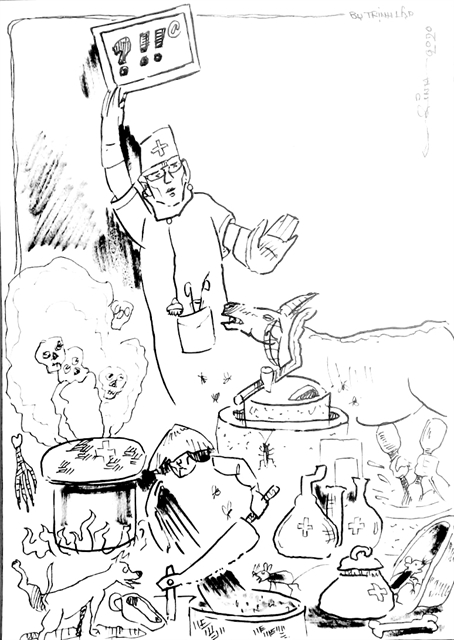 Talk Around Town
Talk Around Town

In the boom of social networks, many people think it’s convenient to find information about healthcare online. Be aware that they can receive wrong knowledge, more and more doctors use social networks to make right things go viral.

|
BY MINH THU
As social networks have boomed in popularity a lot of people have come to believe it’s a good source of information on healthcare. Aware of how much wrong information there is out there, more and more doctors have in turn been using social networks to set the record straight.
Dr Ngô Đức Hùng, 40, from Bạch Mai Hospital in Hà Nội is a pioneer in using Facebook to address urgent issues regarding health. He has become a hot Facebooker, with many posts on bad habits in and wrong opinions on healthcare.
“As social networks have developed, people can find information on health problems and even ask others for advice when they aren’t feeling good,” Hùng said.
“While the symptoms may be similar, it’s dangerous to just take the same medicine as someone you’ve come across online. When their children suffer from an allergy or fever, people take a photo, upload it on social networks, and ask others for a cure. But no one is able to make a medical judgement based on photos.”
He also feels concern upon seeing groups of people share wrong information about cancer treatments or encourage others to become anti-vaxxers.
And at Bạch Mai he has treated many emergency cases because of unsafe detoxification methods.
“One time a 16-year-old girl had tried to detoxify her body by drinking sugarcane and lime juice, which she found on the internet,” he said by way of example. “She had slipped into a coma. People can die from doing stupid things like this.”
So he decided it was time for doctors to raise awareness about the problem with finding remedies online.
“This is dangerous, because wrong information can reach so many people,” he said. “We have to speak out for the sake of public health and science and because it’s the right thing to do.”
Dr Hùng is not just active on social networks. He has also released books combining information on common diseases with the wrong way to treat them, so that people may understand more about healthcare.
His latest book, 3 Phút Sơ Cứu (First Aid in Three Minutes), published in June, was hugely popular. It presents basic information on first aid, explains how to remove a foreign object from your child’s nose or throat, and advises what to do when someone has been electrocuted, among many other useful tips.
Paediatrician Nguyễn Trí Đoàn in HCM City also decided to share his knowledge about caring for children on social networks. In his 20 years as a doctor he has seen that many parents are learning how to take care of their children on Facebook.
“Many parents, especially mothers, worry about their children’s weight,” Dr Đoàn said.
“Vietnamese mothers love to see their babies quickly put on weight and grow concerned if they look a little slim. They don’t understand that being fat doesn’t equal being healthy. One mother told me she uses sugarcane juice in her infant’s diet in the belief it adds weight. I could only sigh. Excessive sugar puts kids at risk of become obese and having tooth decay.”
He began livestreaming, where he would talk about childcare and answer questions from mothers about a range of matters.
“Apart from posting stories about childcare, I also livestream on Facebook to help more mothers,” he said.
Hạ Nhi, a mother in HCM City, said she follows Dr Đoàn and subscribes to the YouTube channel of Dr Trần Văn Công to obtain more information on taking care of her son.
“While Dr Đoàn livestreams and talks directly with mothers, Dr Công uses YouTube to share his experience in childcare,” she said.
“From him I learned how to clean my baby’s nose the right way.
“Hospitals in Việt Nam are always crowded and doctors are often too busy to answer every question a patient has, so I appreciate doctors who use social networks to share their knowledge with regular people.”
Many believe that doctors in Việt Nam are difficult to approach and become irritated by too many questions. But in recent years this seems to have changed, and most doctors are now friendlier and more accessible.
A survey by the health ministry, released in May last year, found improvements in patient satisfaction with medical services in Việt Nam in 2018.
The average patient satisfaction index (PSI) reached 4.04/5 in regard to the quality of medical examinations and treatment, up from 3.98/5 in 2017.
Vietnamese doctors have indeed become more open-minded and accessible, not only at hospitals but also on social networks and in the mass media.
They appear on TV talk shows, write books, hold livestreams, and post on Facebook and YouTube in the hope of providing the right information to more and more people. VNS